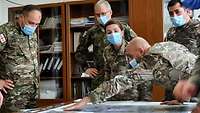Next step towards interoperability
Next step towards interoperability
- Date:
- Place:
- Rhineland-Palatinate
- Reading time:
- 2 MIN
During his visit, the Director of the Multinational Medical Coordination Centre/ European Medical Command (MMCCMultinational Medical Coordination Centre/EMCEuropean Medical Command) presented the first results of work on the NATONorth Atlantic Treaty Organization initiative of the Substantial NATONorth Atlantic Treaty Organization-Georgia Package (SNGP) to the political and military leadership of the Georgian armed forces. One milestone was the analysis of the Georgian Armed Forces' medical service capabilities and possibilities for the targeted further development of the medical service."
This milestone describes the starting point of the implementation phase," says the director of the multinational element, Dr. Stefan Kowitz, looking ahead to the steps ahead.The capabilities for the brigades' medical forces will be built up gradually and in modules. Two lines of development are in the foreground. Building up the personnel capabilities with the appropriate training to operate a highly mobile medical unit as well as the necessary material supplements to enable a treatment outcome in line with NATONorth Atlantic Treaty Organization and civilian requirements.
Civilian and military usability as a factor
"According to our analysis, the capabilities to be built up in the future enable use both for military tasks but also in crises or disasters to support the civilian health system, so-called dual-use capabilities," adds the MMCCMultinational Medical Coordination Centre/EMCEuropean Medical Command director.
In her opening remarks, the Deputy Minister of Defence, Ms. Lela Chikovani, also honoured the "dedicated and hard work" and the joint team effort of the Georgian Medical Service and the MMCCMultinational Medical Coordination Centre/EMCEuropean Medical Command delegation. She also mentioned additional cooperation opportunities with the EUEuropean Union. The possible harmonisation of NATONorth Atlantic Treaty Organization and EUEuropean Union activities, is not a difficulty for the MMCCMultinational Medical Coordination Centre/EMCEuropean Medical Command, as it closely cooperates and collaborates with both institutions according to its mission.
Familiarisation with and practice in the NATONorth Atlantic Treaty Organization structure
Knowledge and understanding of NATONorth Atlantic Treaty Organization standards form the foundation for the development of the respective medical service capabilities of the Georgian armed forces. Following the kick-off of the implementation phase, a training team from the MMCCMultinational Medical Coordination Centre/EMCEuropean Medical Command relocated to Georgia. "Working the new knowledge into existing structures in a guided environment and adjusting it for one's own system generally has a far greater effect than just imparting knowledge would have." This is how Colonel Jürgen Muntenaar, head of the training team and MMCCMultinational Medical Coordination Centre/EMCEuropean Medical Command deputy director for NATONorth Atlantic Treaty Organization affairs, describes his training method.
Rescue chain: focus on communication and transport
During the training, the exercise participants not only learned about NATONorth Atlantic Treaty Organization structures, standardisation documents and terminology, but also applied their knowledge in a table-top exercise. In this exercise, the medical care of sick and wounded people was practised along the rescue chain. As a member of the MMCCMultinational Medical Coordination Centre/EMCEuropean Medical Command team, Oberstabsbootsmann Stefanie Hippler also supported the Georgian comrades and saw "the special challenges in ensuring stable communication of the medical forces during the transport of the wounded, especially with the medical facilities to be taken in.




